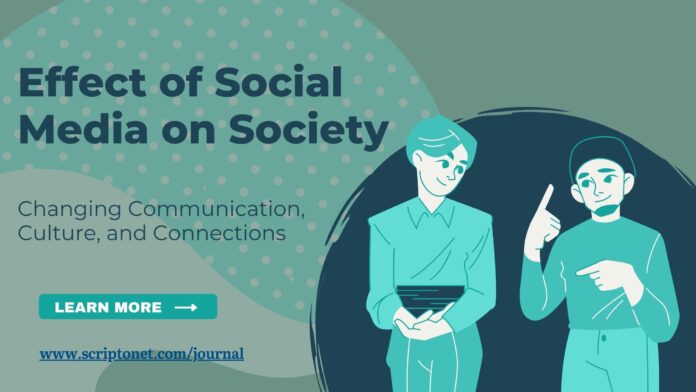Introduction
Social media are interactive technologies that facilitate the creation, sharing & aggregation of content such as ideas, interests & other forms of expression amongst virtual communities & networks. These are websites & applications that enable users to create & share content or to participate in social networking. Platforms like Facebook, Instagram, Twitter & TikTok allow people to connect & share content. Let us find out what are the effect of social media on society.
Social media is experiencing a significant growth in its influence with a rising number of users spending more time on social platforms, leading to a greater impact on public opinion, information dissemination & even political discourse, making it a powerful tool for communication & engagement across various aspects of society. This increase is driven by the accessibility of smartphones & the constant evolution of new platforms.
This shift has significantly altered traditional mass communication channels, which were previously dominated by television, radio & print media. Effect of Social media on Society offer immediate access to a global audience and are therefore a powerful tool for mass communication.
Positive effect on society
Social media has profoundly reshaped the fabric of our society, offering a multitude of positive effects that have redefined how we interact, learn & engage with the world. It has democratized communication, breaking down geographical barriers & enabling instant connection with friends, family & colleagues across the globe. This constant connectivity strengthens relationships, allowing individuals to maintain close ties regardless of physical distance & fostering a sense of belonging within a global community.
Beyond personal connections, social media platforms have become vital channels for information dissemination. News, updates & diverse perspectives spread rapidly, keeping individuals informed about current events & fostering a more engaged citizenry. This rapid flow of information can be particularly crucial during times of crisis, facilitating quick responses & aid efforts.
Furthermore, social media has provided a powerful platform for marginalized voices to be heard. It empowers individuals & communities to share their stories, advocate for their rights & organize social movements. These platforms have become instrumental in raising awareness about critical issues, challenging existing power structures & driving positive social change. The ability to connect with like-minded individuals & mobilize collective action has amplified the impact of activism & fostered a greater sense of social responsibility. In addition to its social & political impact, social media has also revolutionized education & professional development.
It provides access to a wealth of online resources, from educational courses & tutorials to professional networking opportunities. Individuals can connect with experts in their fields, learn new skills & advance their careers, regardless of their location or background. While it’s important to acknowledge the potential downsides of social media, such as the spread of misinformation & the potential for cyberbullying, it’s equally crucial to recognize & celebrate the numerous ways in which it has positively impacted society by fostering connectivity, facilitating information sharing, empowering individuals & communities & promoting education & professional growth.
Negative effect on society
While social media offers numerous benefits, it also presents several negative effects on society. The constant connectivity can lead to feelings of being overwhelmed & anxiety, with individuals struggling to disconnect & experiencing a fear of missing out (FOMO). This can contribute to mental health issues like depression & anxiety, particularly among young people. Furthermore, the curated nature of online profiles can create unrealistic expectations & promote social comparison, leading to feelings of inadequacy & low self-esteem.
The spread of misinformation & fake news through social media platforms is another significant concern, eroding trust in institutions & fueling social division. Echo chambers & filter bubbles can reinforce existing biases & limit exposure to diverse perspectives, further polarizing society. Cyberbullying & online harassment are also prevalent issues, causing significant emotional distress & harm to individuals. The anonymity afforded by the internet can embolden some individuals to engage in abusive behavior with little accountability. Additionally, excessive social media use can lead to addiction & decreased attention spans, impacting productivity & academic performance.
The constant stream of notifications & updates can be distracting, making it difficult to focus on tasks & engage in deep thought. Finally, concerns about data privacy & the misuse of personal information by social media companies raise ethical questions & pose potential risks to individual autonomy & security. These negative effects highlight the importance of critical thinking, media literacy & responsible social media use to mitigate the potential harms & maximize the benefits.
Conclusion
In conclusion, social media presents a complex & multifaceted landscape with both significant benefits & drawbacks. While it has undeniably revolutionized communication, fostering global connectivity & empowering marginalized voices, it also poses challenges related to mental health, misinformation, cyberbullying & privacy. The curated nature of online personas can contribute to unrealistic expectations & social comparison, while the rapid spread of misinformation & echo chambers can polarize society & erode trust. Cyberbullying & online harassment create significant emotional distress & excessive social media use can lead to addiction & decreased attention spans.
Therefore, it is crucial to approach social media with a critical & discerning eye, recognizing its potential for both good & harm. Promoting media literacy, responsible online behavior & open dialogue about the ethical implications of social media are essential steps in mitigating the negative effects & maximizing the positive impact. Ultimately, navigating the social media landscape requires a balanced approach that embraces the opportunities for connection & information sharing while remaining mindful of the potential pitfalls & striving for a healthier & more informed online experience.
Frequently Asked Questions (FAQ)
How has social media positively impacted society?
Social media has revolutionized communication by breaking geographical barriers, fostering global connections & strengthening relationships. It enables the rapid spread of information, promotes social activism & provides a platform for marginalized voices. Additionally, it enhances education & professional growth by offering access to resources, online courses & networking opportunities.
What detrimental impacts does social media have on mental health?
Excessive social media use can contribute to anxiety, depression & feelings of inadequacy due to social comparison & unrealistic portrayals of life. The fear of missing out (FOMO) & the pressure to maintain an ideal online presence can lead to emotional distress, especially among young people. Cyberbullying & online harassment further exacerbate mental health challenges.
How does the dissemination of false information benefit from social media?
Social media facilitates the rapid dissemination of news, but it also enables the spread of misinformation & fake news. Echo chambers & algorithm-driven content can reinforce biases, limiting exposure to diverse perspectives. This can lead to social polarization & distrust in institutions, making media literacy & fact-checking essential.
Can social media be addictive?
Yes, social media can be highly addictive due to its constant notifications, endless scrolling & instant gratification. Excessive use can reduce productivity, shorten attention spans & negatively impact academic or professional performance. Many platforms are designed to maximize user engagement, making it crucial to practice digital wellness & set boundaries.
What measures can be taken to use social media responsibly?
To use social media responsibly, individuals should practice media literacy, verify sources before sharing information & set time limits to prevent overuse. Engaging in respectful online interactions, being mindful of mental well-being & protecting personal data are also important. Encouraging open discussions on ethical online behavior can help create a healthier digital environment.


